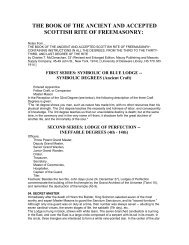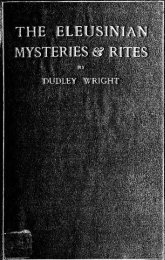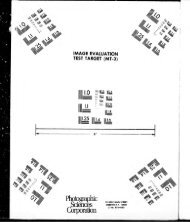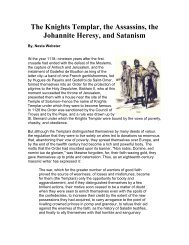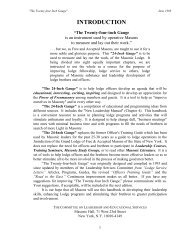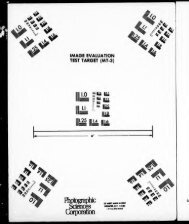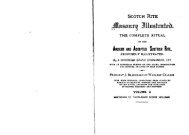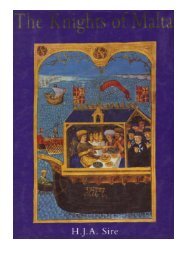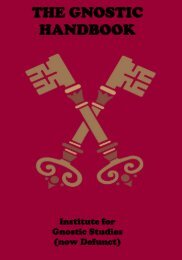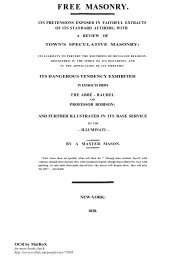The History of Initiation - The Masonic Trowel
The History of Initiation - The Masonic Trowel
The History of Initiation - The Masonic Trowel
Create successful ePaper yourself
Turn your PDF publications into a flip-book with our unique Google optimized e-Paper software.
THE CELTIC MYSTERIES. 123<br />
peak only, represented the male principle;<br />
with two<br />
peaks, the figurative lunette or Ark, symbolized the<br />
female principle; and with three, the two principles<br />
united. 39<br />
each nation feigned to be within its own boundaries. When a moun-<br />
tain was adorned with three peaks, therefore, it was accounted<br />
perfect,<br />
and worthy <strong>of</strong> superior veneration, from its apt representation <strong>of</strong> this<br />
union <strong>of</strong> the sexes, which furnished the natural means by which the<br />
world was repeopted. (Yid. Signs and Symbols, Lect. 9.) Perfect<br />
specimens <strong>of</strong> all these varieties <strong>of</strong> mountains are frequent in the<br />
counties <strong>of</strong> Lancaster, Cumberland, and Westmoreland; and I cannot<br />
but think that this part <strong>of</strong> the island was a favourite resort <strong>of</strong> the<br />
druids for j they contained every requisite in vast abundance for the<br />
practice <strong>of</strong> their religious rites. <strong>The</strong> rivers and lakes ; the many<br />
natural caverns and excavations the ; numerous specimens <strong>of</strong> the holy<br />
mountain in every possible variety afforded such ; a combination <strong>of</strong><br />
natural facilities for the exercise <strong>of</strong> their mysterious celebrations, that<br />
they could not be overlooked by that acute and politic order <strong>of</strong> men.<br />
Accordingly, we find, in the stupendous monuments with which these<br />
counties still abound, the most positive traces <strong>of</strong> Druidical ingenuity<br />
in all its several forms whether ;<br />
consisting <strong>of</strong> stone or earthen temples,<br />
the cromlech or the kistvaen. the logan or the tumulus, the seat<br />
<strong>of</strong> justice or the sacred all grove: being unquestionable evidences <strong>of</strong><br />
Druidical habitation. A learned and indefatigable writer, whose<br />
opinions claim every attention and respect, says the same thing <strong>of</strong><br />
"<br />
some <strong>of</strong> the southern counties. Numerous remains <strong>of</strong> stone circles,<br />
cromlechs, rocking stones and tumuli still exist in the Scilly islands,<br />
and are continued along the coast <strong>of</strong> Cornwall and Dorset, to the<br />
widely-extended plains <strong>of</strong> Wiltshire ; all, from their rudeness, bespeaking<br />
a very ancient, and, I may pronounce, a Celtic origin; and<br />
corresponding in a very striking degree with those on the opposite<br />
shores <strong>of</strong> our mother country Gaul." (Hoare's Ancient Wilts., vol.<br />
i. )P . 12.)<br />
39 We are indebted to Capt. Wilford for bringing to light a recorded<br />
tradition <strong>of</strong> the Hindoos, that the British Druids held mountains and<br />
"<br />
lakes in superior veneration from the causes just enumerated. Britain,"<br />
says this author, " was termed by the Indians, Tricatachel, or<br />
the mountain with three peaks and was hence considered as a ;<br />
place<br />
<strong>of</strong> peculiar sanctity. England was denominated, Rajata-Dweep ; Scotland,<br />
Scuteya-D weep; and Ireland. Suvarna-Dweep. <strong>The</strong> pitris, or<br />
primitive fathers, were said to reside in Suvarna ; and their place <strong>of</strong><br />
abode was either on the summit <strong>of</strong> a mountain, or in a cave called<br />
Maha Dewa, in an island situate in the midst <strong>of</strong> a lake, whose waters<br />
were reputed bitter. From this cave issued a long passage into the<br />
infernal regions. Here the souls <strong>of</strong> their deceased ancestors were<br />
invoked." This is a correct account <strong>of</strong> a place <strong>of</strong> initiation, and is<br />
thought to have a reference to the celebrated Purgatory <strong>of</strong> St. Patrick,<br />
in Lough Derg, in Ireland, into which no person was allowed to enter<br />
without first undergoing all the ceremonies <strong>of</strong> purification and preparation.<br />
This purgatory, according to the opinion <strong>of</strong> Mr. Faber (Myst.<br />
Cab., vol. ii., p. 392), was, doubtless, a place appropriated to the performance<br />
<strong>of</strong> the rites <strong>of</strong> Druidism. It will be remembered that the



